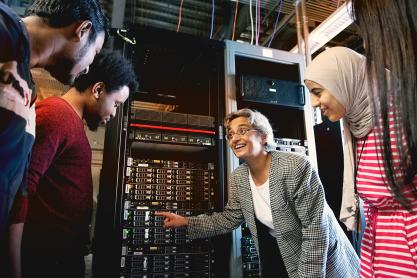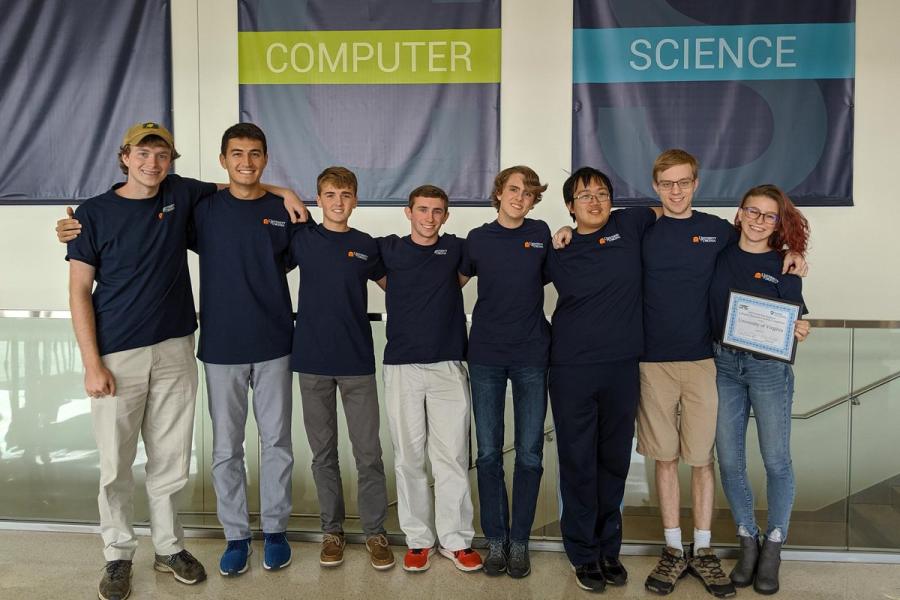There are 195 countries on Earth, and in her lifetime, University of Virginia School of Engineering professor Malathi Veeraraghavan visited at least 150 of them.
In Memoriam: Malathi Veeraraghavan, Champion of Ideas and Experiences
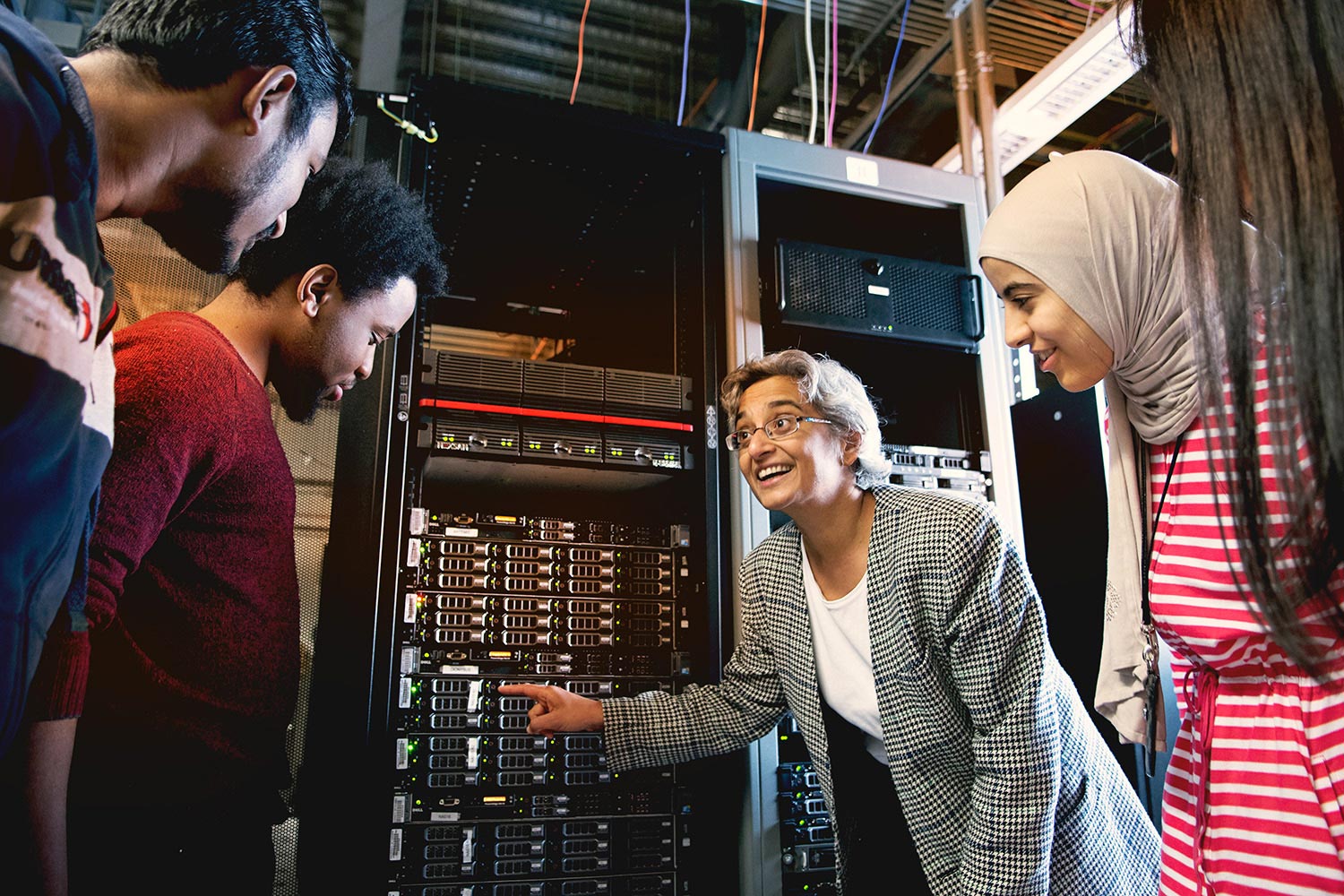
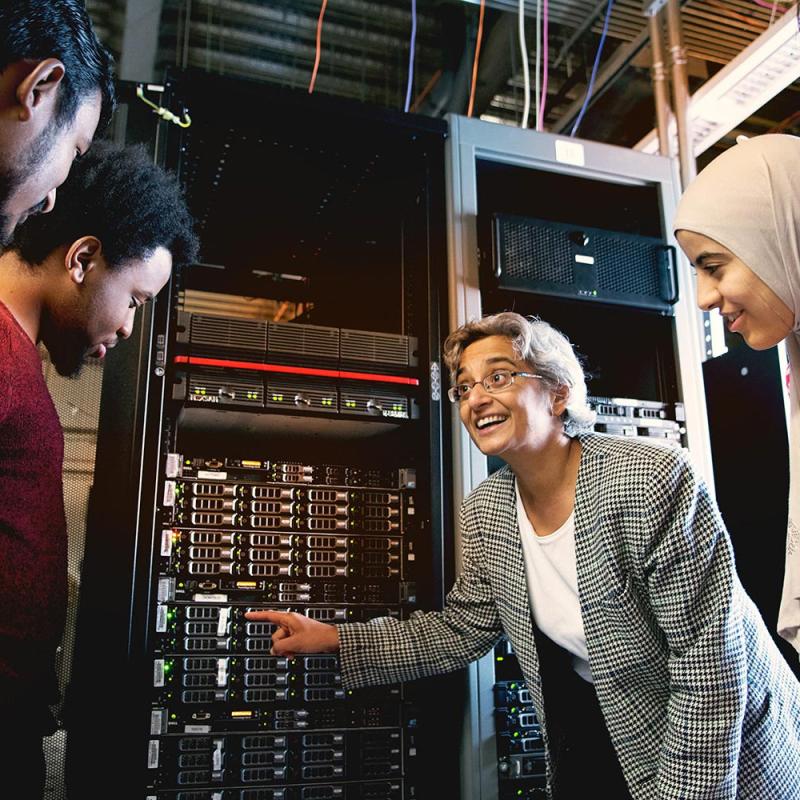
In Memoriam: Malathi Veeraraghavan, Champion of Ideas and Experiences
Colleagues remember computer engineering professor Malathi Veeraraghavan’s curiosity, warmth and lifelong passion for teaching and travel.
Veeraraghavan died May 11 in Charlottesville at age 57. Those who knew her say her world travels and voracious reading enabled her to relate to people and their problems from multiple perspectives. This enriched her significant teaching and research accomplishments in computing architectures, protocols and network systems that generated growth and opportunity in mobile communications and cloud computing. Veeraraghavan had more than 30 patents and 200 peer-reviewed publications to her name.
“When my father passed away on Aug. 9, 2016, my mother asked us (their four children) to write our recollections about him,” Veeraraghavan wrote in a 2016 essay for young people entitled “What Should I Do With My Life?” “For me, it was something he said often: ‘Do not chase fame or money, pursue knowledge.’”
Veeraraghavan joined the UVA faculty in January 2003 as associate professor and director of computer engineering, with joint appointments in the Department of Computer Science and the Charles L. Brown Department of Electrical and Computer Engineering. In this role, Veeraraghavan led creation of a joint graduate program that offered master’s and Ph.D. degrees in computer engineering. She was promoted to professor in 2007.
UVA Engineering Dean Craig H. Benson said Veeraraghavan enriched the lives of students and colleagues. “Malathi generously shared her expertise in teaching, research and living a quality life,” Benson said. “What our community will miss most is her personal example. We will honor her memory by supporting each other’s successes and working together to make the world a better place.”
“Malathi had an amazing work ethic,” said Nikolaos Sidiropoulos, Louis T. Rader Professor and chair of the Department of Electrical and Computer Engineering. “Malathi’s research often took unpredictable turns, as she was always looking around the corner, inspired from ideas in other disciplines. Her relatively recent turn to artificial intelligence and cybersecurity is just one example.”
Earlier this year, Veeraraghavan was elevated to fellow of the Institute of Electrical and Electronics Engineers for contributions to control-plane architectures, signaling protocols and hybrid networks.
“It is a great loss for our department and the field of optical networks,” said Archie Holmes, professor of electrical and computer engineering and UVA vice provost for academic affairs.
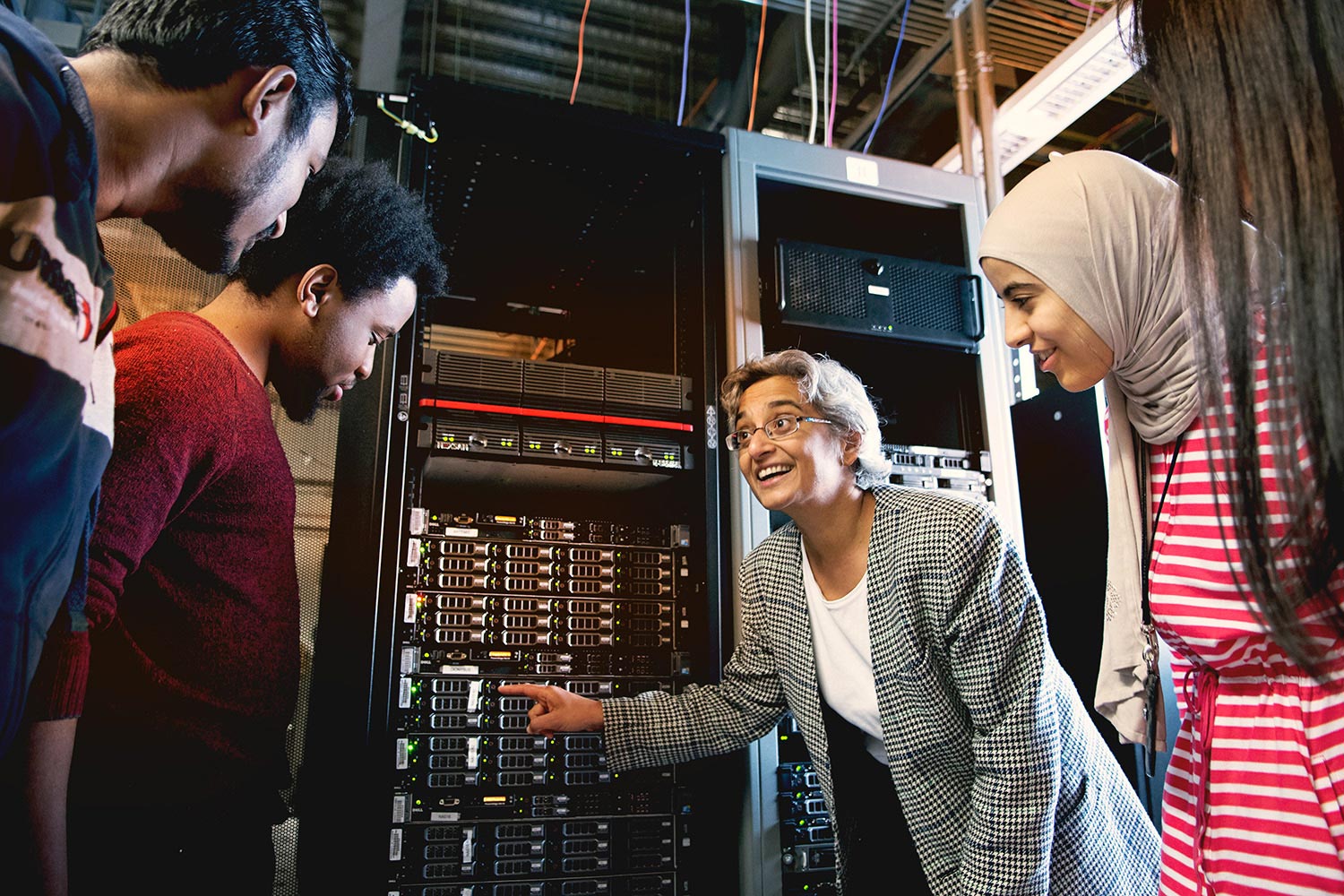
Veeraraghavan earned her Bachelor of Technology from the world-renowned IIT Madras in 1984, one of only four women in her electrical engineering class. She came to the United States and earned her Master of Science and Ph.D. degrees from Duke University in 1985 and 1988, respectively. She then joined Bell Laboratories, where she worked for 10 years, starting as a member of the technical staff and quickly rising to become a distinguished member.
As an inventor at Bell Labs, Veeraraghavan created an efficient call-processing architecture that enabled delivery of voice communications and multimedia sessions over the Internet. This innovation greatly reduced the cost of using telephone networks and lowered barriers to entering the telecommunications market.
Sidiropoulos remembers Veeraraghavan as an outside-the-box thinker. Veeraraghavan knew her idea for the network architecture would be a tough sell. The new type of packet switch she envisioned would jeopardize AT&T’s market share in equipment manufacturing, but she was undeterred. Veeraraghavan commended colleagues at Bell Labs and AT&T for seeing the big picture to advance the industry as a whole.
“Malathi lived her life with an incredible and constructive spirit, and stayed true to her convictions,” Sidiropoulos said.
Veeraraghavan’s distributed call-processing architecture fostered new products for 3G, 4G and software-defined networks that underpin today’s dynamic configuration and monitoring of network performance. From this foundation, Veeraraghavan extended the innovative call-processing architecture to wireless networks. This move spurred development of novel mobility management techniques, to hand off calls from one cell tower to the next.
Veeraraghavan was gratified by her research at Bell Labs, but she also understood that a rise through the corporate structure would pull her away from research questions that she was passionate to pursue.
“Malathi was so passionate and inquisitive,” recalled Maite Brandt-Pearce, professor of electrical engineering and UVA vice provost for faculty affairs. “I will miss our fervent disagreements about the future of optical networks. We have lost a great thinker and colleague who dedicated her life to her science and her students.”
Transitioning from industry to higher education, Veeraraghavan started as an adjunct professor at Polytechnic University in New York City, and would parlay that experience into an appointment as associate professor. With her graduate student Haobo Wang and colleague Ramesh Karri, Veeraraghavan designed and demonstrated a revolutionary approach to implement signaling protocols to autonomously set up and release network connections as mobile devices move in and out of range of call towers or wireless routers.
Veeraraghavan’s next and related invention, direct signaling, was a precursor to today’s web-based telephony services. Thanks to this innovation, consumers are no longer tied to their network service provider in their search for add-on services or “apps.”
The rapid and global expansion of the telecommunications industry generated a data tsunami and set the conditions from which large-scale datacenters and their cloud-based services would emerge. These developments exponentially increased network complexities. To help condition, process and store information within and across enterprise networks, Veeraraghavan designed a network traffic engineering system that could detect and reroute large-sized flows for efficient transit and processing, reducing real-time delays or buffering. Her solutions paved the way for distributed storage and processing of big data, in which many computers work together to solve problems involving massive amounts of data and computation.
Shortly after joining UVA, Veeraraghavan served as principal investigator of a $3.5 million multi-university grant awarded by the National Science Foundation. With partners from North Carolina State University, City University of New York and the Oak Ridge National Laboratory, Veeraraghavan built an experimental, wide-area network that extended from Washington, D.C., to Raleigh, North Carolina, and on to Atlanta, with high-speed transport and signaling protocols for fast movement of large datasets and remote visualization.
More recently, Veeraraghavan led a multidisciplinary research group of graduate students, research scientists and faculty members dedicated to network security and intrusion detection, supported by a $9 million investment from the Defense Advanced Research Projects Agency. Veeraraghavan credited two computer engineering Ph.D. students, Yizhe Zhang and Hongying Dong, for the team’s success in presenting their research findings to their federal program managers.
Veeraraghavan welcomed Zhang and Dong to the team even though they had little background knowledge in cybersecurity. “I appreciated Professor Veeraraghavan for giving me this great opportunity to be part of the DARPA project. She guided my broader thinking on research goals and helped me deeply analyze research findings with my collaborators,” Dong said.
Although it may be hard for faculty and students to fathom, Veeraraghavan initially had a hard time adjusting to the classroom at UVA. “My first crop of students at UVA helped me understand that teaching is all about high touch. If you start focusing on students, teaching is a lot of fun,” Veeraraghavan once said.
“Her life has affected thousands of people, and I believe it will continue to be so.”-- 2020 graduate Josie Li
Veeraraghavan liked to share this vignette from her time at Duke University, where she became a fan of the Durham Bulls baseball team: She and fellow students would ride their bikes to the field to do homework during the games. The games became a lot more fun once she got to know the players – their bios, their stats and their interests outside the ballpark.
Veeraraghavan brought this same curiosity about her students to UVA’s Grounds, recognizing each by name and getting to know who they really are.
“I was an undergraduate research assistant for Professor ‘V’ for two years, and she had great influences on not only my academics, but also my views about life,” said Josie Li, who graduated May 16 with a degree in computer engineering and a second major in computer science. “In the research, she made me question the unknowns, explore all possibilities and achieve perfection. When I asked her about life choices, she never gave me the answer directly. Instead, she would ask me, ‘What do you want to achieve for your life?’ She said that there are two ultimate ways of life: One is to focus on yourself and those around you, and the other is to help as many people as possible. While both of them will render a fulfilling life, Professor ‘V’ chose the latter, and had no regrets, but happiness. Her life has affected thousands of people, and I believe it will continue to be so.”
Veeraraghavan’s students showed their appreciation through the Gamma Pi Chapter faculty award and the Department of Electrical and Computer Engineering’s faculty educational innovation award.
She believed in acquiring knowledge for its own sake and encouraged students to make room for new topics, to later connect ideas to problems in unexpected ways.
“Malathi was such a joy to work with,” Benton H. Calhoun, professor of electrical and computer engineering, said. “I love that it was impossible to talk to her without hearing something unique or learning a new perspective. I have never known anyone who could continually bring such depth of curiosity, inquiry and enthusiasm to literally every conversation.”
Steven M. Bowers learned this during his first encounter with Veeraraghavan during the hiring process; Bowers is an assistant professor in the Department of Electrical and Computer Engineering. “Rather than discuss anything technical, we talked about her ‘South is Up’ map the entire time, discussing how different viewpoints can shape how we see the world, and the importance of travel to better understand another’s viewpoint.”
A short time after Avik Ghosh, a professor of electrical and computer engineering, described two countries he had visited that were not among those stamped in Veeraraghavan’s passport, she reported that she had taken his recommendation and completed trips to both – on different continents, no less.
“When Malathi shared with me how many countries she had visited, I was not surprised, as she clearly loved to learn,” UVA Engineering Executive Dean Pamela M. Norris said. “On another occasion, I was thrilled to ask her to share her thoughts with faculty members who were tasked with recruiting new faculty, because I knew full well she would provide them a bibliography of books to catch themselves up on best practices. She was a patient educator for all those with whom she interacted. I will so miss her.”
“I love that it was impossible to talk to her without hearing something unique or learning a new perspective. I have never known anyone who could continually bring such depth of curiosity, inquiry and enthusiasm to literally every conversation.” – Benton H. Calhoun, professor of electrical and computer engineering
What Veeraraghavan couldn’t sense firsthand, she learned from books. “Malathi was never one to be overwhelmed,” said Nathan Swami, professor of electrical and computer engineering. “I remember the many discussions on topics of great passion to her, on which she widely quoted from the most recent books she had just read on world travel, globalization and U.S. history.”
Keith Williams, associate professor of electrical and computer engineering, had a lot of fun comparing notes. “She was quite the adventurer and loved her travel partnership with her husband, Shri,” Williams said. “Besides giving me a few more places to visit, she also directed my attention to some interesting studies on diverse topics, including history, policy and psychology. She read and digested ideas like no one else.”
Veeraraghavan channeled her energy and “get-it-done” spirit into every activity, while remaining a patient educator and valued mentor.
“She was always available to listen and guide me through, often by telling stories from her own life experiences,” said Homa Alemzadeh, assistant professor of electrical and computer engineering. “I am indebted to her mentorship when I submitted my first collaborative proposal. She continued to help me until just a couple of months ago with her kind, candid advice that I will truly miss.”
Miaomiao Zhang, assistant professor of electrical and computer engineering and computer science, will also miss Veeraraghavan’s friendship. “She was so kind and enjoyable to chat with. Her smiles and encouragement on being a new working mom remain vivid in my mind.”
Cong Shen, who just last year joined the Department of Electrical and Computer Engineering as an assistant professor, also benefited from Veeraraghavan’s mentorship and personal example. “Knowing that I’m a junior faculty who just started at UVA, Malathi gave me much advice, ranging from research group management to proposal writing to the future of wireless networks,” Shen said. “But above all these, what struck me most was her spirit and enthusiasm when facing adversity.”
It is impossible to beckon a single word that captures all that Veeraraghavan meant to her colleagues and the field of electrical and computer engineering. Professor Scott Acton may have come the closest, synopsizing faculty members’ sentiments this way: “So many of us are too predictable, and Malathi had the beautiful quality of unpredictability. Malathi could literally revise a paper while walking her dog; she could stand up to powerful people, and she could smile with her eyes.”
Media Contact
Article Information
September 14, 2025
